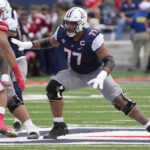Washington State president Kirk Schulz on Saturday signaled a willingness to work with his peers on the College Football Playoff’s governing board to identify a “financial arrangement” suitable for the remaining Pac-12 schools in exchange “for a yes vote” on proposed changes to the event.
In the wake of the Pac-12’s collapse, which leaves the sport with four power conferences, the CFP’s management committee this week reportedly recommended two changes to the expanded, 12-team playoff that starts next season:
- Shift the access to five automatic bids and seven at-large bids from the format that had been previously approved (six automatic bids and six at-large bids).
- Require a conference to have at least eight members in order to qualify for an automatic berth.
However, the changes proposed by the 10 FBS commissioners and Notre Dame’s athletic director must be approved by the university presidents that make up the CFP’s board of managers.
A unanimous vote is required, meaning Schulz, as the Pac-12’s representative to the board, could block any changes.
“I have read what’s in the media, but I haven’t sat down and read the proposal,” Schulz said Saturday prior to the Washington State-Cal game.
He planned to chat with Pac-12 commissioner George Kliavkoff over the weekend to settle on a strategy that suits WSU and Oregon State, the two remaining members of the Pac-12 as of next summer.
The schools might operate as a two-team conference in 2024-25, a period that coincides with the final two years of the CFP’s media contract with ESPN.
“We’ll make a judgement about what we want to do, or if there’s a request to make of our partners in return for a yes vote,” Schulz said.
“I think it will happen quickly. There’s an eagerness to get it resolved before the CFP championship game.”
The Pac-12 receives roughly $75 million annually from the playoff, or about $6 million per school.
The conference is retaining its board seat despite the collapse, and the Beavers and Cougars want to keep their revenue shares.
“Financial resources are important,” Schulz said. “We need to define what it means to be a Power Five conference. There is no NCAA guideline.
“And we need to figure out what’s reasonable for the next couple years in terms of a financial arrangement.”
[related_articles location=”left” show_article_date=”false” article_type=”automatic-
*** Send suggestions, comments and tips (confidentiality guaranteed) to pac12hotline@bayareanewsgroup.
*** Follow me on Twitter: @WilnerHotline
*** Pac-12 Hotline is not endorsed or sponsored by the Pac-12 Conference, and the views expressed herein do not necessarily reflect the views of the Conference.
Related posts:
 Wilner Hotline -Business of Sports: Pac-12 Athletic Departments Close Books on 2021
Wilner Hotline -Business of Sports: Pac-12 Athletic Departments Close Books on 2021

(AP Photo/Ralph Freso, File)
Wilner Hotline – College Football Playoff to Remain at Four Teams
Arizona offensive lineman Jordan Morgan (77) (AP Photo/Rick Scuteri)
NFL Draft winners and losers: Pac-12 shines before extinction while new versions of SEC, Big Ten dominate Wilner – UC regents expected to hit UCLA with maximum annual subsidy — err, “contribution” for Cal
Wilner – UC regents expected to hit UCLA with maximum annual subsidy — err, “contribution” for Cal
Jon Wilner
Jon Wilner has been covering college sports for decades and is an AP top-25 football and basketball voter as well as a Heisman Trophy voter. He was named Beat Writer of the Year in 2013 by the Football Writers Association of America for his coverage of the Pac-12, won first place for feature writing in 2016 in the Associated Press Sports Editors writing contest and is a five-time APSE honoree.
